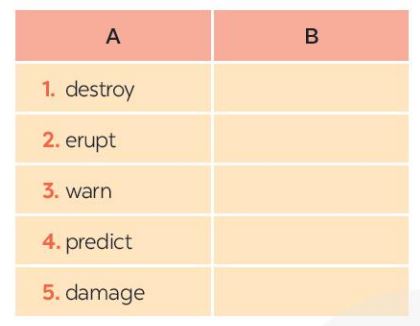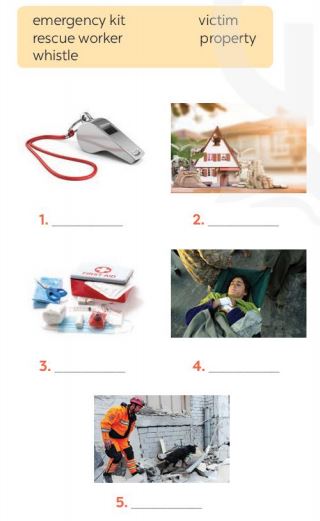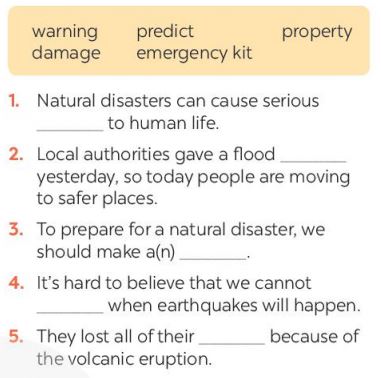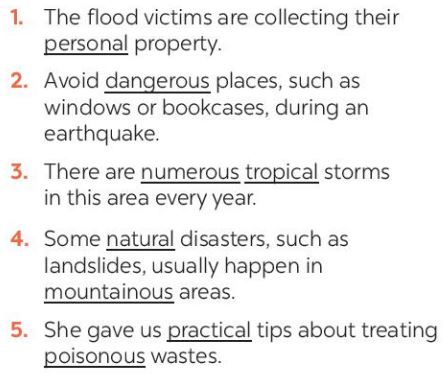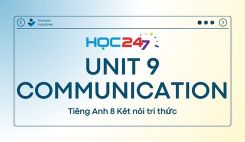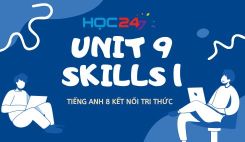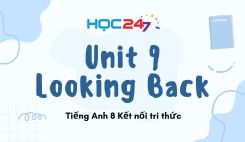Nhằm giúp các em mở rộng vốn từ liên quan đến chủ đề "Thảm họa thiên nhiên" và hướng dẫn các em nhấn vào các từ có kết thúc bằng đuôi –al hoặc -ous, mời các em tham khảo nội dung bài học bên dưới do HOC247 biên soạn chi tiết và rõ ràng trong Unit 9 Natural disasters thuộc chương trình Tiếng Anh lớp 8 Kết nối tri thức phần A Closer Look 1.
Tóm tắt bài
1.1. Unit 9 lớp 8 A Closer Look 1 Task 1
Vocabulary
In column B, write the noun forms of the verbs in column A.
(Ở cột B, viết dạng danh từ của động từ ở cột A.)
Guide to answer
|
A |
B |
|
destroy (phá hủy) |
destruction (sự phá hủy) |
|
erupt (phun trào) |
eruption (sự phun trào) |
|
warn (cảnh báo) |
warning (lời cảnh báo) |
|
predict (dự báo) |
prediction (sự dự báo) |
|
damage (làm hư hại) |
damage (thiệt hại) |
1.2. Unit 9 lớp 8 A Closer Look 1 Task 2
Write a word or phrase from the box under the correct picture.
(Viết một từ hoặc cụm từ từ trong khung dưới hình ảnh đúng.)
Guide to answer
1. whistle
2. property
3. emergency kit
4. victim
5. rescue worker
1.3. Unit 9 lớp 8 A Closer Look 1 Task 3
Fill in each blank with a word or phrase from the box.
(Điền vào mỗi chỗ trống với một từ hoặc cụm từ trong khung đã cho sẵn.)
Guide to answer
1. damage
Natural disasters can cause serious damage to human life.
(Thảm họa thiên nhiên có thể gây ra những thiệt hại nghiêm trọng đên cuộc sống loài người.)
2. warning
Local authorities gave a flood warning yesterday, so today people are moving to safer places.
(Giới chức trách địa phương đã đưa ra cảnh báo về lũ lụt hôm qua, nên hôm nay mọi người đang di chuyển đến những nơi an toàn hơn.)
3. emergency kit
To prepare for a natural disaster, we should make a(n) emergency kit.
(Để chuẩn bị cho thiên tai, chúng ta nên làm một bộ dụng cụ khẩn cấp.)
4. predict
It’s hard to believe that we cannot predict when earthquakes will happen.
(Thật khó để tin là chúng ta không thể nào dự đoán khi nào động đất sẽ xảy ra.)
5. property
They lost all of their property because of the volcanic eruption.
(Họ mất hết tài sản vì núi lửa phun trào.)
1.4. Unit 9 lớp 8 A Closer Look 1 Task 4
Pronunciation
Listen and repeat the words. Pay attention to the word stress.
(Lắng nghe và lặp lại các từ. Chú ý đến trọng âm của từ.)
Guide to answer
musical /ˈmjuː.zɪ.kəl/: vở nhạc kịch
dangerous/ˈdeɪn.dʒər.əs/: nguy hiểm
humorous/ˈhjuː.mə.rəs/: tính hài hước
national /ˈnæʃ.ən.əl/: thuộc về quốc gia
practical /ˈpræk.tɪ.kəl/: thiết thực, có ích
poisonous /ˈpɔɪ.zən.əs/: có độc, độc hại
personal /ˈpɜː.sən.əl/: dành cho cá nhân, riêng tư
marvellous /ˈmɑːr.vəl.əs/: tuyệt diệu, phi thường
1.5. Unit 9 lớp 8 A Closer Look 1 Task 5
Listen and repeat the sentences. Mark the stress in the underlined words.
(Nghe và lặp lại các câu. Đánh dấu trọng âm trong các từ được gạch chân.)
Guide to answer
1. The flood victims are collecting their personal property.
(Những nạn nhân của trận lũ đang gom nhặt những tài sản cá nhân.)
→ personal /ˈpɜː.sən.əl/
2. Avoid dangerous places, such as windows or bookcases, during an earthquake.
(Tránh những nơi nguy hiểm trong lúc động đất, như cửa sổ hay giá sách.)
→ dangerous /ˈdeɪn.dʒər.əs/
3. There are numerous tropical storms in this area every year.
(Có vô số cơn bão nhiệt đới ở khu vực này mỗi năm.)
→ numerous /ˈnjuː.mə.rəs/, tropical /ˈtrɒp.ɪ.kəl/
4. Some natural disasters, such as landslides, usually happen in mountainous areas.
(Vài thiên tai như sạt lở đất, thường xảy ra ở những vùng núi.)
→ natural /ˈnætʃ.ər.əl/, mountainous /ˈmaʊn.tɪ.nəs/
5. She gave us practical tips about treating poisonous wastes.
(Cô ấy đã cho chúng tôi những lời khuyên thiết thực về xử lý chất thải độc hại.)
→ practical /ˈpræk.tɪ.kəl/, poisonous /ˈpɔɪ.zən.əs/
Bài tập minh họa
Make questions for the underlined words.
1. The Muong people often play flute, trumpet and gong. (What)
___________________________________________________________.
2. Ao dai is the traditional costume in Vietnam. (What)
___________________________________________________________.
3. The Cham children are named after the family name of their mothers. (Who)
___________________________________________________________.
4. The highlights of the Muong costume are embroidered on the dress hem and belt. (Where)
___________________________________________________________.
Key (Đáp án)
1. What do the Muong often play?
2. What is the traditional costume in Vietnam?
3. Who are named after the family name of their mothers?
4. Where are the highlights of the Muong costume embroidered?
Luyện tập
3.1. Kết luận
Qua bài học này các em cần ghi nhớ các từ vựng sau:
Vocabulary
+ numerous: to lớn, mênh mông
+ tropical: thuộc về nhiệt đới
+ whistle: tiếng còi, huýt sáo
+ natural disaster: thảm hạo thiên nhiên
+ victim: nạn nhân
Pronunciation
Stress in words ending in –al and –ous
(Nhấn vào các từ kết thúc bằng đuôi –al và –ous)
1. Words ending “al” (Các từ kết thúc bằng “al”)
The rule: The stress is often on the third to last syllable. Similarly, you count syllables backwards and put a stress on the third one from the end.
(Quy luật: Trọng âm thường ở âm tiết thứ ba đến âm tiết cuối cùng. Tương tự, bạn đếm ngược các âm tiết và đặt trọng âm vào âm thứ ba tính từ cuối.)
Ví dụ: logical /ˈlɒdʒɪkl/
2. Words ending “ous” (Các từ kết thúc bằng “ous”)
- The ‘ous’ ending is a de-stressed syllable and is pronounced as /əs /.
(Hậu tố 'ous' là một âm tiết được giảm trọng âm và được phát âm là /əs/.)
- The rule (Quy luật)
+ Words ending in ‘ous’ with 2 syllables have their stress on the first syllable
(Những từ kết thúc bằng 'ous' có 2 âm tiết thì trọng âm rơi vào âm tiết thứ nhất)
Ví dụ: famous /ˈfeɪməs/
+ Words ending in ‘ous’ with 4 syllables usually have their stress on the second syllable.
(Những từ kết thúc bằng 'ous' có 4 âm tiết thường có trọng âm rơi vào âm tiết thứ hai)
Ví dụ: luxurious /lʌɡˈʒʊəriəs/
+ Words ending in ‘ous’ with stress on first syllable
(Những từ kết thúc bằng 'ous' với trọng âm ở âm tiết đầu tiên)
Ví dụ: dangerous /ˈdeɪndʒərəs/
3.2. Bài tập trắc nghiệm Unit 9 - A Closer Look 1
Như vậy là các em đã xem qua bài giảng phần Unit 9 - A Closer Look 1 chương trình Tiếng Anh lớp 8 Kết nối tri thức. Để củng cố kiến thức bài học mời các em tham gia bài tập trắc nghiệm Trắc nghiệm Unit 9 lớp 8 Kết nối tri thức A Closer Look 1 - Cái nhìn chi tiết 1.
-
Câu 1:
Choose A, B, C, or D to indicate the correct answer to each of the following questions: My parents have left for English since I ___________ at primary school.
- A. have been
- B. was
- C. had been
- D. am
-
Câu 2:
Choose the best answer: My parents lent me the money. _____________, I couldn’t have afforded the trip.
- A. Therefore
- B. Otherwise
- C. Only if
- D. However
-
Câu 3:
Choose the correct answer: _____________, she will go to sleep.
- A. By the time she finished the home work
- B. After she was finishing the homework
- C. When she finished the homework
- D. As soon as she has finished the homework
Câu 4-10: Mời các em đăng nhập xem tiếp nội dung và thi thử Online để củng cố kiến thức về bài học này nhé!
Hỏi đáp Unit 9 - A Closer Look 1 Tiếng Anh 8
Trong quá trình học tập nếu có thắc mắc hay cần trợ giúp gì thì các em hãy comment ở mục Hỏi đáp, Cộng đồng Tiếng Anh HOC247 sẽ hỗ trợ cho các em một cách nhanh chóng!
Chúc các em học tập tốt và luôn đạt thành tích cao trong học tập!
-- Mod Tiếng Anh 8 HỌC247


